As a piece of our business at Impossible X, we regularly work with clients and startups to scale their business efforts exponentially as well as our other projects in-house. I haven’t written a lot about our work on the blog, but today I wanted to share with you a success story – how we tripled the organic traffic of a Chicago-area TechStars company in just over six months.
Note: The date range from this specific case study is from April 2013 to December 2013. Due to the nature of startups in the parking space, I waited a few months to post this so it’s not reflective of SpotHero’s current product or status (they’re even farther ahead now).
Here’s the story:
The Background
Table of Contents
I had met Mark when he was running Lifestyle Ignition and planning to bike across Africa. He was one of the first “bloggers” I ever met when I started this site almost four years ago. He quit those plans to help his friend Jeremy (who was working at a pizza place at the time) start this “parking thing”. It was supposed to be AirBnB for parking except neither of them knew how to code – It was bound to end well, right?
Good luck 🙂
But Mark was persistent. Both he & Jeremy had a no-fail attitude that made them see opportunity in something that most see impossible. Starting out, their site was *rough* – like rough. Checkout was run through Amazon payments and “marketing” was me helping him out by running “ads” on an ad hoc basis (which consisted of the following calls:
Hey, Joel can you spend $10 on Chicago Air Show Parking?
Hey, we’ve got $5 can we put that towards Navy Pier Parking?
I’d laugh & nod and fit in the work when I had some free time.
They entered their idea into Excellerate Labs (now Chicago Tech Stars), an accelerator for startups based out of Chicago. The first year, they were rejected straight away due to lack of traction, but the next year (2012) they were accepted and started ramping up quick.
As they grew, they got funding, they hired a full-time marketing director (they didn’t need me to handle the one-off ads anymore) and had some success at the Chicago Tech Stars. We popped in once in a while to talk strategy, work on sites and catch up, but mostly I was relatively uninvolved for their summer session.
Then I got this phone call:
The Call
It was about 8pm on a Friday. It was Mark.
Hey, Mark. What’s up?
I’m good. I got a question.
Shoot.
What do you think about Impossible Ventures putting together a marketing proposal for SpotHero?
Sure. What up?
It’s not super important but I wanted to know if you’d be interested in handling our AdWords for us?
Sure. When would you want to talk? What do the next few weeks look like for you?
Oh, I was thinking Monday.
As in this Monday? In three days?
Yeah.
Ha! I’ll see what I can do.
I showed up that Monday with a rough draft of the AdWords strategy. Off the cuff, Mark asked if I would be interested in adding in a part about SEO strategy. I don’t typically offer SEO deals to clients but, because Mark was a friend, I made an exception, added in a clause, we shook on it, and we got started immediately.
Over the next seven months, SpotHero expanded to seven cities and we tripled their organic traffic, grew their conversions and organic growth, expanded their conversion, and increased the number of landing pages by thousands.
As a side note: on AdWords, we virtually quadrupled conversions, doubled their conversion rate, doubled their click-through rate, and slashed CPAs by 30%. But that’s a whole different blog post for another time.
After setting up e-commerce tracking in Analytics, and seeing the revenue generated from the work we did, I joked that I was massively undercharging! 🙂 It’s okay – I still like you, Mark!
This is how we did it.
Honestly Understand Your Place In the Market
If you want to be the best, you have to be the best. Pretty simple, right? Well, you can’t be the best if someone else is beating you. (This isn’t brain science.)
We looked at our competitors. At the time, they were killing us. That was the truth. Keyword: was
We had a few competitors in the space. Let’s call them P1 and P1.
- P1 had a nice architecture but had no traction in the SERPS, although they had a good number of locations, they weren’t ranking much.
- P1 had good traction with sporting venues and had been around longer than anyone else, but didn’t have much pull outside those arenas. They were leading because of the time head start they’d had.
- SpotHero had good traction in Chicago. In fact, in Chicago we dominated, but we were sorely behind on the national scale. We really only had parking in DC and Milwaukee and nothing on the site related to anything beyond that.
There were a few other competitors out there but we didn’t have time to be distracted by everyone, so we focused on the two in front of us. And I’ll be honest – they were ahead of us. We had our work cut out for us, but it’s much better to be behind and have a clear picture of where you are than to delude yourself about reality.
Draft off The Giants
A lot of business I look at get caught up in their own businesses that they can’t think big. They get stuck looking at their current surroundings and have trouble moving beyond where they currently are.
Instead of thinking about what our site was and how we could make incremental improvements, we decided to look at the players that we wanted to be like and do something similar. You don’t need to reinvent the wheel – let other people do it.
We looked to the internet giants. The giants have it all figured out (mostly). I looked at the companies in similar verticals as us and realized that, if we were going to take SpotHero from a regional Chicago company to a national company, we were going to have to make some big changes.
So we started looking at what some of the brands that did things well did:
Exhibit A: AirBnB
AirBnB is a great example of a company that’s not only national but international and which serves a two-sided markets (both renters and people looking to rent). They’re also worth ten billion dollars.
That seemed like a good place to start.
Here’s what the AirBnB homepage looks like:
What’s awesome about AirBnB’s page is this:
- Easy search bar at top
- List of most popular cities
- List of all cities (if you hit the “all neighborhood guides” link)
- All major questions answered on homepage
- How to Host?
- How To Travel?
- Is This Safe?
From an SEO standpoint, their list to all major locations off their homepage but in a visual fashion so they get the value of SEO links from their homepage without the clutter that would normally come from a list of 6-50 links. When you click on these, you go to a dedicated AirBnB city page:
Here’s what AirBnB city pages look like:
Here’s what awesome about AirBnB’s city pages:
- They’re easy to look at.
- They have neighborhood guides that are relatively in-depth.
- They’re easy to navigate and understand.
- There’s a lot of content overall.
- Their site structure is pretty robust (take a look at their sitemaps)
When you look at what AirBnB does, they have focused content guides around not only all major cities, but all major neighborhoods in their cities they want to serve. From a google standpoint, that not only makes them a definitive resource for traveling, but about the city in general. If someone looks up information about that city, they’re going to run into AirBnb and (hopefully) book a room.
Nicely done AirBnB.
Exhibit B: Hipmunk
Hipmunk does an amazing job on its content marketing and website structure and is almost a better example to use for SpotHero’s infrastructure because their basically the same model but for different industries (SpotHero bills itself as the Orbitz for parking). In my review, AirBnB has a better site experience than Hipmunk, I think Hipmunk does a much better job at content marketing and we wanted to take a few things away from their site.
Hipmunk’s Home Page
Notice they have the same visual city layout on the page as Airbnb – Prediction: all major international companies will adopt some sort of this format going forward. It might change graphically, but the structure will stay the same.
- Immediate search on the homepage.
- Press features on the home page.
- Value prop at the top of the page
Again, from an SEO standpoint, they have all their major cities (read money makers) on the home page with a list to all of their money makers under the “view all hipmunk city guides.” Again, they’re not just organized as “guides’, but they’re actually useful guides that you’d find uber-helpful wehther you plan on using Hipmunk or not:
Hipmunk City Guides
In their major cities, they even broke this down for neighborhoods of major downtown areas:
So what did we do? We decided to take those pages, chop out AirBnb and anything about hotels and replace it with SpotHero and parking. Of course we added our own work to it too, but that was the plan starting out. Here’s how SpotHero ended up looking before & after we went to work. You’ll notice that even after we went live in other cities, for the longest time our home page still read “Find a Chicago Parking Spot” and if you wanted to choose anything other than “Chicago” you had to do it from the upper right-hand dropdown. Afterwards, we not only had more links going directly from the home page to the city-specific pages, but we also made it usable.
Get To Work
So what sort of work did we actually start to do? The list was pretty long:
We had to create city guides.
We needed to create in-depth guides about parking problems in Chicago (and other cities once we expanded outside just Chicago). We wanted to address parking problem as well as we could through content and then get customers to the place that could easily solve their problems (the SpotHero app). These guides ended up catching lots of the “city parking” and “parking in city” traffic.
We had to create more neighborhood guides.
We then did the same for neighborhoods. In any major top 20 city, neighborhoods garner as much if not more traffic than the city search terms. We needed to knock this out of the park and make sure we had content for this.
We had to build out more landmarks.
We had covered almost all the major tourist attractions in most of our cities but we had to systematically add hundreds of other secondary landmarks that were searched for on a “long-tail” perspective.
We had to build out more locations.
At time I got the “call”, we had few hundred locations done between Chicago, DC, and Milwaukee. (I could be off, but I believe the number was less than 300). That was it.
Not even close to acceptable. We had to build out literally thousands of these locations in a few months. We began building out parking locations for everyone and their mother – locations for every building, business, and landmark in any city we were in. It worked.
I checked the other day and we had over 15,000 locations. Much better.
We had to get people to link to us.
We hired a PR team and they went right to work.
Please note: this doesn’t work if your product sucks, your PR team sucks, or you’re terribly uninteresting and/or selfish. The difference between a good and a bad PR team is like night and day. Make sure you know how the people you’re hiring approach publishers on your behalf, otherwise they could do more bad than good.
Create Systems
Starting out, SpotHero had one person to help with content – Joe – SpotHero’s content master. Joe is a smart dude – but he can’t make time stand still. If we were going to do this, there was no way we were going to do it ad hoc, fitting in tasks one by one. We needed to build a system to dominate this stuff.
I started building SOPs or standard operating procedures for tasks we found ourselves doing over & over again. I picked these up from Dan at TMBA. Instead of doing things piece by piece, we broke down each major task and laid out exactly what needed to be done. Then we identified the tasks we were going to be doing over and over again.
- Creating massive amounts of content
- Creating massive amounts of locations
- Creating massive amounts of outreach
Oh, and all of this work had to be good, solid work that stands the test of time & won’t get us slapped by google. That means no spams, no scraping, no sh*t.
We broke each task down into a system. We created a process for each step and sometimes wrote processes for each sub-process (at one point we had a SOP for creating a SOP – no joke).
This took a lot of time and a lot of caffeine to get up and running but, once we did, it helped us with the next step oh, so much.
I’m convinced there’s nothing better you can do for your business or startup than create systems. At one point, a guy came into our office peddling SEO services and mentioned he could help build out landing pages – maybe 2,3 a week extra. He was speechless when we told him we were able to build out 1,000/week. He literally didn’t know what to say. It wasn’t that we were geniuses – we had just built a system.
Outsource The Boring Tasks
If you want to grow a national company, you need to be able to scale nationally. The challenge is scaling the site and work efficiency without spending tons on labor costs.
We decided to outsource everything that was boring.
We used FBC and hired agents to handle many of the processes. In a sense, this looked like creating mini-human macro. We had spent so much time creating the processes and systems that, when it came to outsourcing it, we didn’t have to spend tons of time teaching, training, and getting agents up to speed. We simply plugged them in, gave them the step-by-step process we had laid out, and told them to get started.
How did we make those processes and make sure that anyone with half a brain could walk up, knowing nothing about SpotHero, and start completing the work we had piling up? We took each one and downloaded it from our brains.
We’d sit down and pick an activity we’d have to do over and over, and create a process out of it. In a way, it was much like writing a macro or another piece of programming with several if/then statements.
- Pick a process.
- Talk through it out loud (with one person taking notes).
- Every time you come to a major decision point, lay out the options available.
- Lay out the criteria for making decisions (if this, then that).
- For communication outreach and common situations, lay out the exact verbiage to use.
- Lay out the length that they should do this for or
Once we had those systems laid out, we started outsourcing like a mofo.
If you’re a startup looking for outsourcing help, check out Support Zebra.
We quickly ramped things up. We paid enough to find quality VAs and assigned them to one process each. Instead of trying to have them juggle a millions things each, we gave them one process and told them to hammer away at it until we said “when.” That allowed us to scale the way we needed to and also cut down on the opportunity cost of “task-switching.” Instead of having to train our VAs for multiple things, we gave them each one thing to get good at and had them do just that. Over and over and over.
It’s easier to keep your VAs trained on a small number of tasks and to have them do those same tasks over and over again rather than do a million different things one time. You’ll save time on training, they’ll do the tasks better, and you’ll scale faster.
On top of that, we looked at a bunch of things we were doing and figured out how to do them faster or in bulk.
We wanted SpotHero to work in multiple locations. At the time, we were adding one location at a time. That took forever. So Larry built a bulk uploader, so we could build out thousands of locations at a time. That scaled out over dozens of cities and meant that we could scale the amount of locations we had nationwide in a few months. (You could pull this info from an API but, due to the ways various APIs worked and the efficiency of our process, this was a faster way to scale our immediate needs).
Side note: Most people screw up outsourcing by paying people too little and expecting too much. If you’re going to pay someone $2/hour, be prepared to spend all sorts of time with them. Your time is worth way more than $2/hour, so you don’t want to spend it fixing their mistakes. If you’re unhappy with your virtual assistants, it’s probably your fault. You need to have a process, document it, and do it ten times yourself before you can onboard someone and expect them to handle it. If you have communication problems with basic language issues, you’re going to create more issues for yourself than it’s worth. A good range to aim for here is $6-$10/hour.
Forget about Links
I’ve built sites from scratch to 500,000 visits/month. I’ve never used a back linking service in my life. I haven’t yet found a link building service that I can trust which also provides long term results. Almost all of these services seem to focus on getting short term results, ignoring the longer term SEO consequences of what they’re doing and churning & burning sites over & over again. Very few (if any) focus on playing a game of long ball.
Spam guys tend to stay away from PR because they’re scared to stand out in front of their service (you’ll notice lots of them have cartoon avatars and fake names).
I haven’t found any back link service to be worth it long term and I don’t currently recommend any back linking service.
We did ZERO link building for SpotHero.
Any focused “link building” we did was through a more traditional PR strategy. Not only was this more effective in driving traffic, but it also resulted in better quality links at a cheaper price than any link building companies provide.
People who tend to focus on link aggregation typically end up getting screwed at one point or another. Instead of doing that, focus on legitimate PR. It’s not that much harder, guarantees longer term results, and requires only the integrity to stand behind your services. If you can’t do that, maybe you shouldn’t be in the business you’re in.
Interesting to note: if you build bad links, you can get penalized and may have to start over. If you build good content, regardless of whatever the hell Google does, you still have great content. Start with content.
Not only did this work – it worked fantastically. Here’s just a few of the hits we got when we finally put a dedicated effort towards acquiring free press:
-
ABC Nightly News with Diane Sawyer
-
NBC Chicago
A Few Tips on Quality PR
PR Teams tend to be hit and miss so here are a few tips on finding quality PR people:
- I’ve had more success with smaller firms that are based on results rather than just massive orgs who do presswire releases. It’s the relationships that they’re able to build with various news teams that makes or breaks a good PR person.
- Try to structure your deal around “hits” and pay on a performance basis.
- Get someone who understands rudimentary SEO. We didn’t do any link building (no buying of links, etc), but PR is a way of link-building – IF your press piece actually links back to you. If your PR person understands SEO (even from a rudimentary aspect) your efforts will be multiplied with some nice links back from the New York Times, Wall St. Journal or more.
Content Content Content
Content is king. That’s what everybody says. I don’t actually believe that content is enough anymore. Sure, if you don’t have content, you don’t stand a chance. Sorry not sorry.
What does work? Work your way up the value hierarchy (I lay that out here). That means that I think content resources or organization of content is a big deal. That means things like city guides, airport parking guides, and in-depth blog content that addresses people’s needs is a big deal.
In other words, we wanted content with a purpose. We didn’t just want “pages”. We wanted guides. We wanted things that we would actually use. Content is great to start with, but if you have a slew of content, you’ve just got an encyclopedia. What you want to do instead is create a way for people to find and sort through your information as fast as possible so it takes them to their end goal (which in our case was to have them buy parking).
On top of all that, we also made sure we linked to our high value cities and parking destinations on both our main site and city pages as we grew in order to pass link juice (but also more importantly) drive traffic and help users find their most likely parking destinations as fast as possible.
I should note that due to some technical bandwidth limitations, at some points it was easier for us to create blog content or micro-sites based on WP that gave us the functionality we wanted rather than wait for our team to build a custom in-house solution. An ideal strategy integrates the content & the commerce seamlessly, from the start (very similarly to how Hipmunk runs their site), but sometimes you have to move fast and break things to get results.
The Results
Let’s get to the results. That’s what you came here for, right?
As far as SEMRush goes, you can see here that our keyword universe quadrupled in size. (I’m comfortable sharing this information as this is information anyone can see at SEMRush).
Our keyword universe grew from 11,481 to 48,781 by the time we were finished – approximately a 4x growth in the sheer number of keywords we ranked for. That reflected itself very closely in the Google analytics traffic as well (although in respect to SpotHero’s request, I’m not publishing the specific numerical data).
Google Organic
As SpotHero isn’t public with their numbers yet, they asked me to blur out the actual numbers, (the dips are due to seasonality within the Chicago parking industry, but even with that, you can tell that our overall traffic continued to climb as the seasonality surge in our main major market at the time began to wean). Nevertheless, you can solidly tell that the end point was almost exactly 3x of what we started with 8 months prior.
Bing saw similar growth and our other sites and referral sources grew quite a bit too.
The Revenue
In the less than 3 months of integrating the e-commerce tracking, we brought in well over six figures top-line from organic activity directly to spothero.com. We had several thousands of other dollars attributed to other organic activities as well. If we had e-commerce tracking in place for the entire time, I’d be drooling at the deal I gave Mark at the drop of the hat. 🙂
Recapping it All
For the 5 minute briefing on this gigantic posts, here’s what we did for those of you with short attention spans:
- Instead of trying to be cute and reinvent the wheel, we drafted off the giants and copied what companies we aspired to be like were doing.
- We honestly evaluated where we were at with the competition and the marketplace.
- We built out tons of relevant content and useful destinations in order to create more cash register points on site.
- Systematized the process to eliminate spam, ensure quality & achieve scale.
- We outsourced the non-essential work for ourselves (enabling us to do more with less and scale faster than our competition)
- Systematically reached out to legitimate news sources with a established, quality product in order to create buzz.
Footnotes
A few footnotes & caveats about this entire experience.
- The fun part about working with startups is that you can play around with bigger numbers. That said, while its fun to scale into 7 different markets at once, you need an established system in place in order to support it.
- Huge shout-outs to the dev team of Larry Kiss (SpotHero CTO) and co for pushing out update after update to give us what we needed to make these changes go live. The quality of a good dev team can’t be underrated. You guys are bosses.
- Mark and Jeremy are both friends who I’ve known almost as long as I’ve run my site – way before SpotHero came along. I’m not ignorant enough to think that I’m entirely unbiased in my storytelling here or of my opinion of their business. That said, I’ve spent enough time with both of them in a personal and professional capacity to think they’re going to kill it. Watch out.
TLDR: We watched the big boys, created baller content and great structure, and scaled it like a mother through systems and processes
- P.S. If you’re looking to find city parking without hating your life, check out SpotHero. They’re boss.
- If you’re working on an interesting business and you’re interested in scaling dramatically see Impossible X for other business inquiries. We’re only accepting select clients at the moment but we’d love to hear from you.

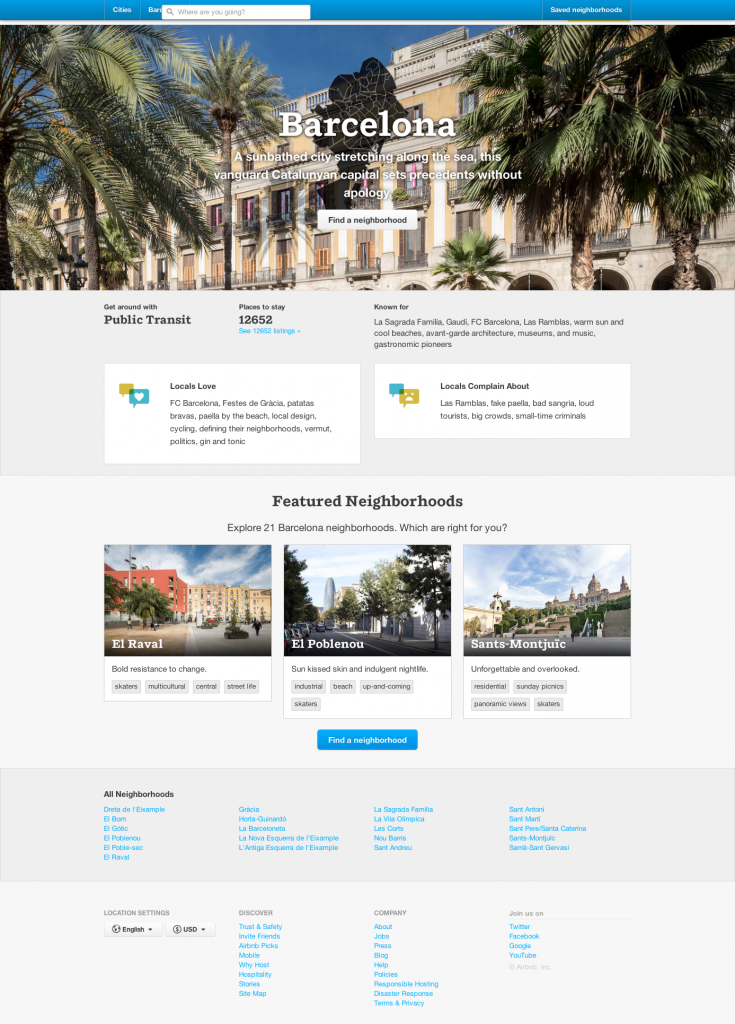
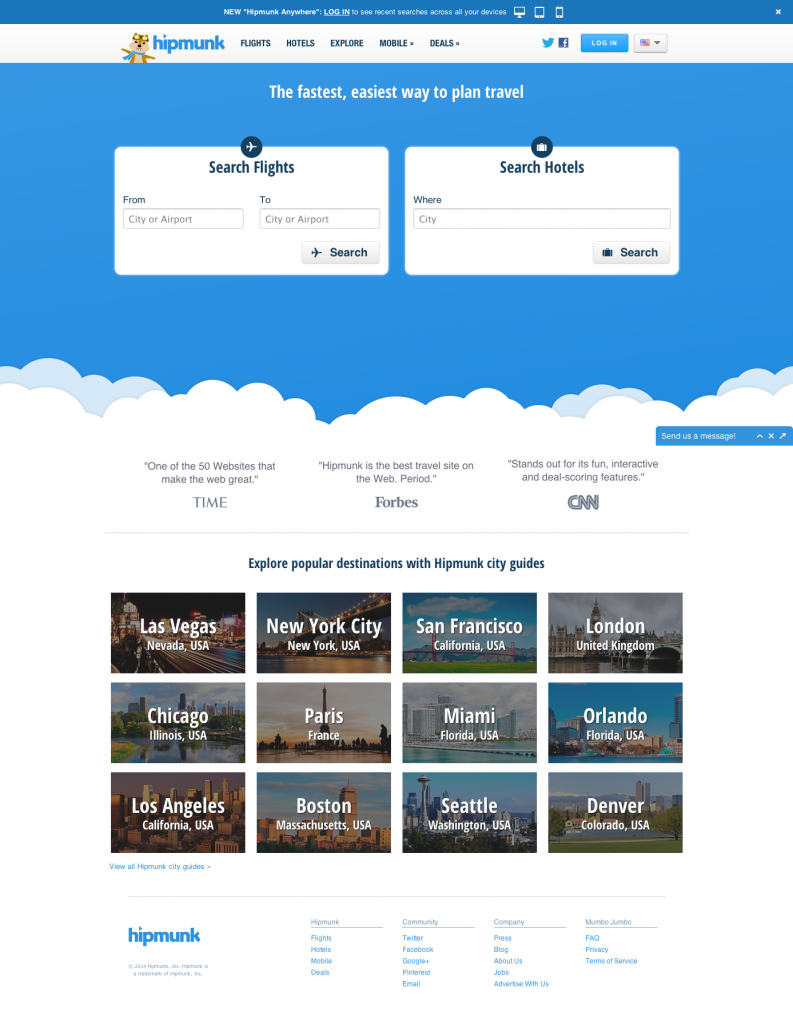
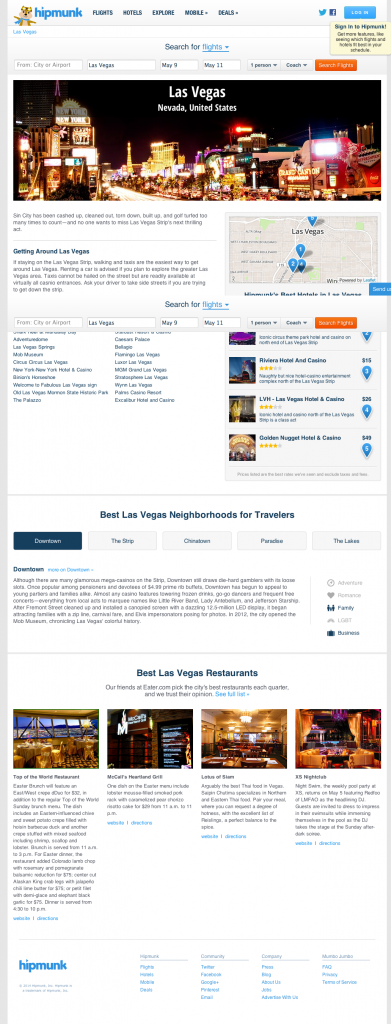
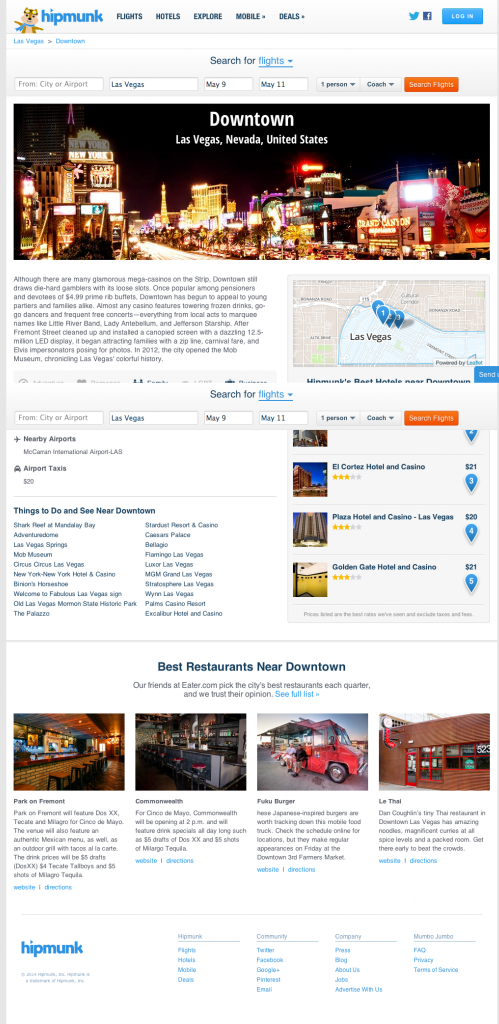
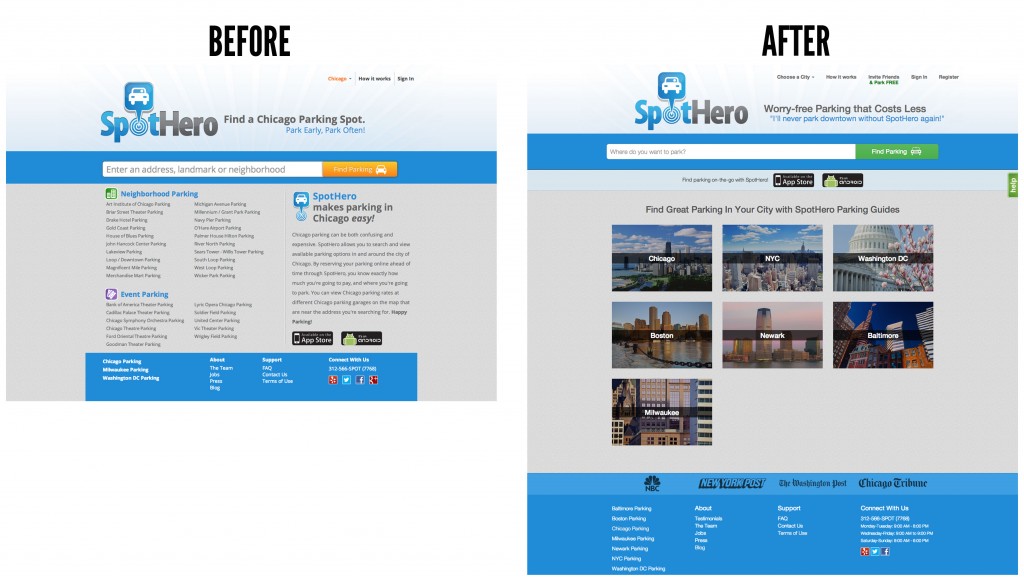
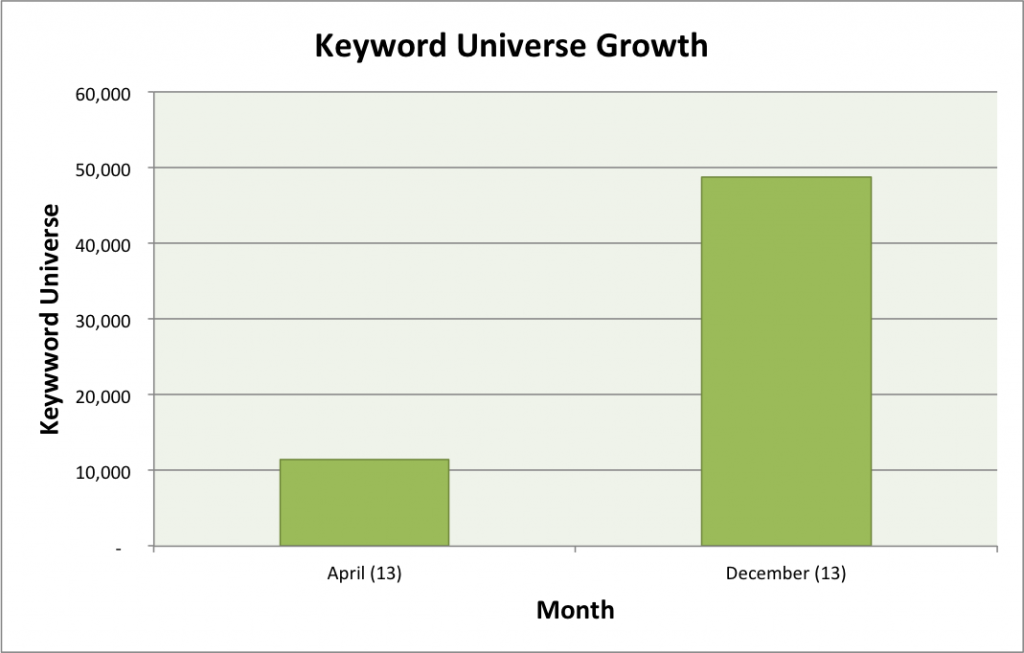
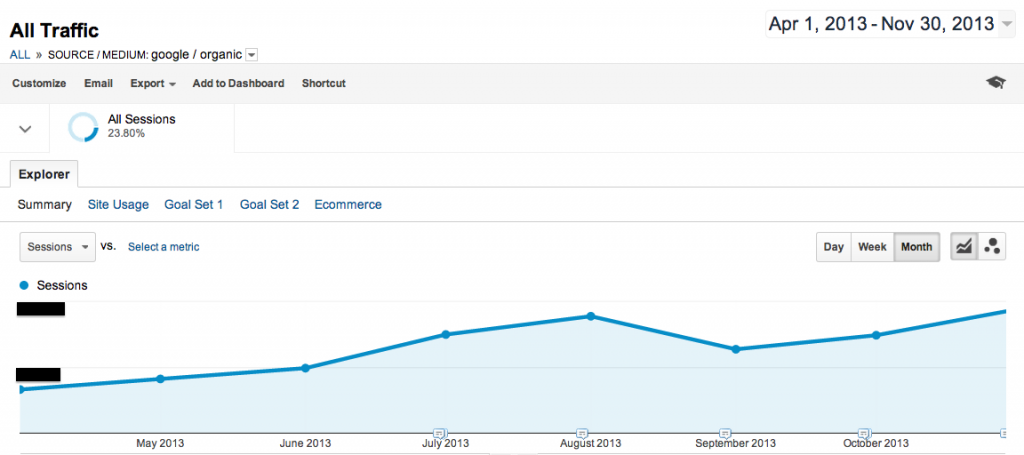

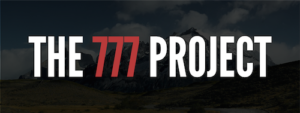
Great post, Joel! So much helpful information! I just shared it with a friend that I think will benefit.
Cheers,
Katie
Brilliant write-up, Joel. Not many people are willing to be so detailed with this kind of strategy. Thanks for taking the time to nab screenshots, to walk us through the plan and to show us how a smart, calculated SEO strategy can pay off. #boom
What’s (especially) great about your post is that you don’t just call it SEO:
1) Instead you show in detail the REAL nitty gritty behind SERIOUS content marketing ON SITE (including process and vendors) – AND how to scale it.
2) Also important is the timeframe you are using – you’re not saying we can do this and see this reaction in 6 weeks – you are using real (but still hyperfast!) dates for both “work-time” and “impact-time” to calculate things.
A lot of clients just won’t understand that both #1 and #2 are required today or their expectations are just not realistic/reasonable.
Thanks for the post!
Seth
Hey Joel,
Awesome post. I didn’t know you were working with SpotHero. I reached out to them at one point to get them on our Valet Parking Podcast, but never heard back. I’ve tracked some of their changes over the past few months and was really impressed with what they’ve been doing. Now I know where it all came from.
Thanks for sharing the success story.
Killer Case Study Joel. Was working on putting one together myself and using this as a model. Does a great job of showing the real value you offer – being able to understand the psychology of a customer and strategically leverage that to achieve business objectives – Ie. You’re Badass at Marketing 🙂
Hi,
Love this article and sincerely appreciate the detail. It’s really helpful for understanding starting hurdles and what to look out for and keep in mind when planning to scale.
I’m working on a similar (but different) model and would love to connect in the future once we get rolling. I’ll definitely try to connect once that happens. For now, just want to say thanks for the information and you gained another follower.
-Samir